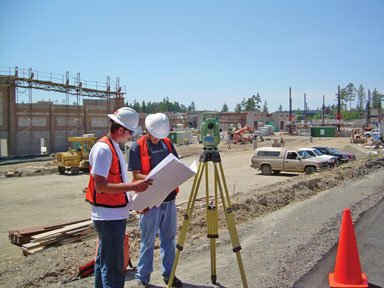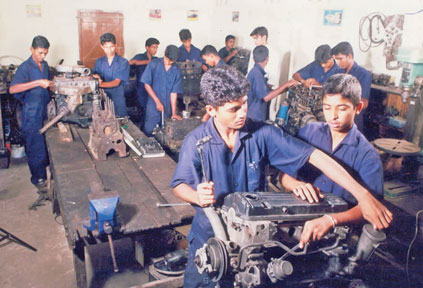|
To provide more opportunities for students:
A technology stream at A/L vital
by Prof. Dayantha WIJEYSEKERA
It is a well-known fact that the GCE Ordinary Level and the Advanced
Level are qualifications obtained through public examinations conducted
by the Department of Examinations of the Ministry of Education. The GCE
A/Level is for the purpose of certifying a person's achievement in
General Education with university selection as an additional outcome.
However, there is a misconception among some that the GCE A/Level
examination is solely for entrance to the conventional universities in
the country.
 |
|
Quantity surveying |
Those who successfully complete their GCE A/Level examination with
the requisite passes, having completed their secondary school education
could proceed to obtain higher education which includes university
education, of course with the required 'Z-score' to the conventional
universities. However, there are students who leave the secondary
schools prior to sitting the GCE A/Level or even before the GCE O/Level
for other forms of education and training. These students depending on
their qualifications in General Education would fall into the category
of Tertiary Education which covers Vocational Education, Technical
Education, Professional Education and also Higher Education and
University Education.
Tertiary is the third stage after primary and secondary schooling.
Those who have followed their education preferably up to GCE O/Level
classes and also those who have proceeded further, but prefer Technical
and Vocational Education and Training (TVET) as their future career
could explore the opportunities available through Tertiary and
Vocational Education Commission (TVEC) registered or accredited courses
of study. The currently available opportunities in the TVET sector could
be obtained from the TVET Guide 2011 by visiting the website
www.tvec.gov.lk link TVET Guide, which is a publication of the TVEC.
Tertiary education
To align youth in secondary schools to the TVET sector which is
essential for the development of any country, the Standing Committee on
Tertiary and Technical Education of the National Education Commission
initiated in February 2009, the deliberations on a Technology stream for
the GCE A/Level in addition to the four existing streams for the GCE
A/Level namely Arts, Bio-Science, Commerce and Physical Science.
The National Education Commission accepted this in early 2010 and
submitted them to President Mahinda Rajapaksa in July 2010 to be among
the recommendations to the National Education Policy on Higher Education
and Technical and Vocational Education. Thereafter, the recommendation
was forwarded to the Ministry of Education and the National Institute of
Education for implementation.
While it was anticipated that at least some secondary schools would
commence this stream in January 2011, it has not materialised.
It is hoped that at least by January 2012 it will be available to
those who aspire to pursue fields of study in further education, having
successfully completed the requisite subjects for the pursuance of the
specific field of education leading to the TVEC accredited Technical and
Vocational Education Certificate, Diploma and even degree
qualifications.
While the engineering faculties of the conventional universities in
Sri Lanka may not accept, in the near future, this stream to be
appropriate as an entry requirement to the BSc (Eng) degree programs,
there are many other faculties in the Sri Lanka university system, TVEC
registered technical training institutes both in the public and private
sector, colleges of technology and technical colleges, vocational
training institutes, catering for the National Vocational Qualifications
(NVQ), who have indicated that this stream would be acceptable as an
entry qualification with the appropriate subject combinations.
Recommended subjects
 |
|
Agro technology |
|
 |
|
A vocational training
centre in operation |
The three groups which have been proposed are shown below with the
recommended subject combinations which could lead to different fields of
further tertiary education covering selected courses in university
education, higher education, technological education, professional
education, vocational education courses of study and training.
Group A:
* Mechanical Technology
* Electrical, Electronics and Information Technology
* Civil Technology
Group B:
* Food Technology
* Agro Technology
* Bio -Resources Technology
Group C:
* Combined Mathematics
* Physics
* Chemistry
* Biology
* Information Technology
* Accountancy
* Economics
* Agriculture
* Geography
The subject combinations recommended are as follows:
I) Three subjects from Groups A and C with one from Group A and two
from Group C.
NOTE: Students selecting Electrical, Electronics and Information
Technology from Group A should select any two subjects from Group C
other than Information Technology
OR
II) Three subjects from Groups B and C with at least one from each
group (See table)
Already available
Since these subjects are already available for the GCE (A/Level)
curriculum, there is no immediate need to prepare new curriculum
material.
Teachers with the technological and/or science qualifications could
be deployed initially on visiting/contract basis, till such time the
University of Vocational Technology (UNIVOTEC) produces graduates of
Bachelor of Education in Technology i.e. B.Ed (Tech) who will be ideally
suited for this purpose.
For the practicals and hands-on experience, the Minister of Education
and Minister of Youth Affairs and Skills Development have given guidance
to the officials to initially share the available laboratory and
workshop resources.
Therefore, there will be some hope in the near future for the
"Technology Preferring Students" not to be classed as "dropouts" but to
develop their careers in specific technology areas even up to degree
level (step by step), which is very relevant to the development needs of
the country.
The writer is the Chairman, of the Tertiary and Vocational Education
Commission (TVEC), and a Member of the National Education Commission for
Technical and Vocational Education and Training (TVET).
Subject Combinations
Computer Science
* Mechanical Technology or Electrical,
Electronics and Information Technology (Group A)
* Combined Mathematics (Group C)
* Physics, Chemistry or Information
Technology (Group C)
Information and Communication Technology
* Mechanical Technology or Electrical,
Electronics and Information Technology (Group A)
* Any two subjects from Group C
Applied Sciences - Physical Science
* Agro Technology (Group B)
* Any two subjects from Group C
Agricultural Technology or Engineering
* Mechanical Technology (Group A)
* Agro Technology or Bio-Resource Technology
(Group B)
* Any one subject from Group C
Environment Conservation and Management
* Chemistry and Biology (Group C)
* Bio-Resource Technology or Agro Technology
(Group B)
Animal Science and Fisheries
* Chemistry and Biology (Group C)
* Bio-Resource Technology or Agro Technology
(Group B)
Food Science and Nutrition
* Food Technology
* Biology
* Chemistry
Food Production and Technology Management
* Chemistry and Biology or Physics (Group C)
* Bio-Resource Technology or Agro Technology
(Group B)
Bio-Sciences
* Chemistry and Biology (Group C)
* Any one subject from Group B
Applied Sciences (Bio-Sciences)
* Chemistry and Biology (Group C)
* Any one subject from Group B
Quantity Surveying
(Building Economics)
* Combined Mathematics (Group C)
* Civil Technology
(Group A)
* Any one subject from Group C
Surveying Science
* Combined Mathematics and Physics (Group C)
* Civil Technology
(Group A)
Town and Country Planning
* Civil Technology (Group A)
* Any subject from Group C
Aquatic Resources Technology
* Chemistry and Biology (Group C)
* Any one subject from Group B
Agriculture
* Agro Technology or Bio-Resource Technology
* Biology
* Chemistry |

